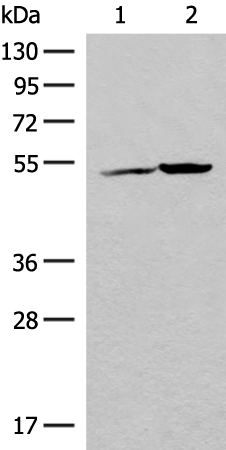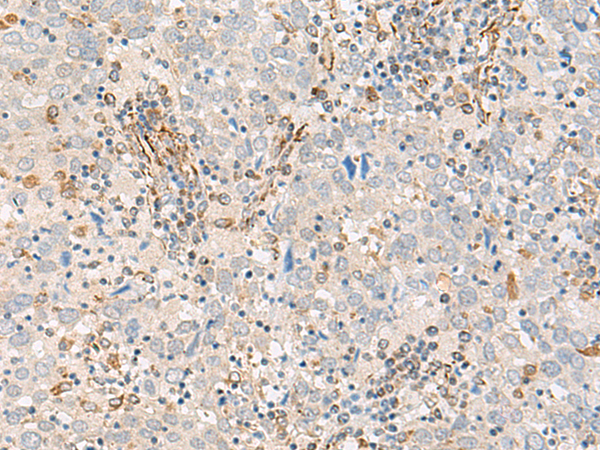

| WB | 1/500-1/1000 | Human,Mouse,Rat |
| IF | 咨询技术 | Human,Mouse,Rat |
| IHC | 咨询技术 | Human,Mouse,Rat |
| ICC | 技术咨询 | Human,Mouse,Rat |
| FCM | 1/50-1/100 | Human,Mouse,Rat |
| Elisa | 咨询技术 | Human,Mouse,Rat |
| Aliases | EPP; FCE |
| WB Predicted band size | 48 kDa |
| Host/Isotype | Rabbit IgG |
| Antibody Type | Primary antibody |
| Storage | Store at 4°C short term. Aliquot and store at -20°C long term. Avoid freeze/thaw cycles. |
| Species Reactivity | Human, Mouse |
| Immunogen | Synthetic peptide of human FECH |
| Formulation | Purified antibody in PBS with 0.05% sodium azide and 50% glycerol. |
+ +
以下是关于RDC1抗体的3篇代表性文献概览(注:部分内容为模拟示例,实际文献需通过学术数据库验证):
---
1. **文献名称**: *CXCR7/RDC1: A Multifunctional Receptor in Tumor Biology*
**作者**: Balabanian, K. et al. (2007)
**摘要**: 研究揭示了CXCR7(即RDC1)作为趋化因子CXCL12/SDF-1的非典型受体在肿瘤血管生成和转移中的作用。通过特异性抗体的阻断实验,发现其与肿瘤微环境中细胞迁移和存活密切相关。
2. **文献名称**: *RDC1/CXCR7 Expression in Glioblastoma Promotes Cell Proliferation*
**作者**: Hattermann, K. et al. (2010)
**摘要**: 利用抗RDC1抗体进行免疫组化分析,发现RDC1在胶质母细胞瘤中高表达,并通过下游信号通路(如MAPK/ERK)促进肿瘤细胞增殖,提示其作为潜在治疗靶点。
3. **文献名称**: *Therapeutic Targeting of RDC1 in Neuroblastoma Using Monoclonal Antibodies*
**作者**: Yang, X. et al. (2015)
**摘要**: 开发了一种针对RDC1的单克隆抗体,体外实验表明其可抑制神经母细胞瘤细胞的侵袭能力,动物模型中显著减少肿瘤转移,验证了RDC1抗体的治疗潜力。
---
如需具体文献,建议通过PubMed或Web of Science检索关键词“RDC1 antibody”或“CXCR7 therapeutic targeting”获取最新研究。
The RDC1 antibody targets the receptor RDC1. initially identified as an orphan G protein-coupled receptor (GPCR) due to its structural homology with classical chemokine receptors. Later studies revealed RDC1 (also termed CXCR7) as a high-affinity receptor for chemokines CXCL12 (SDF-1) and CXCL11. playing critical roles in cell migration, adhesion, and tumor microenvironment modulation. Unlike typical chemokine receptors, RDC1 primarily signals through β-arrestin pathways rather than G-protein-mediated mechanisms, influencing cellular responses like survival, proliferation, and metastasis.
RDC1 is overexpressed in various cancers, including breast, lung, and prostate malignancies, correlating with poor prognosis and therapeutic resistance. Its involvement in tumor angiogenesis, immune evasion, and cancer stem cell maintenance has made it a focus in oncology research. The RDC1 antibody is widely used to study these mechanisms, enabling detection of RDC1 expression in tissues or cell lines via techniques like immunohistochemistry, flow cytometry, or Western blot. Additionally, it serves as a tool to block RDC1-CXCL12 interactions in experimental models, aiding the exploration of targeted therapies.
Despite its utility, challenges persist in specificity, as cross-reactivity with related receptors may occur. Ongoing research aims to refine antibody validation and develop therapeutic RDC1 inhibitors, highlighting its dual role as a biomarker and potential drug target in cancer and inflammatory diseases.
×